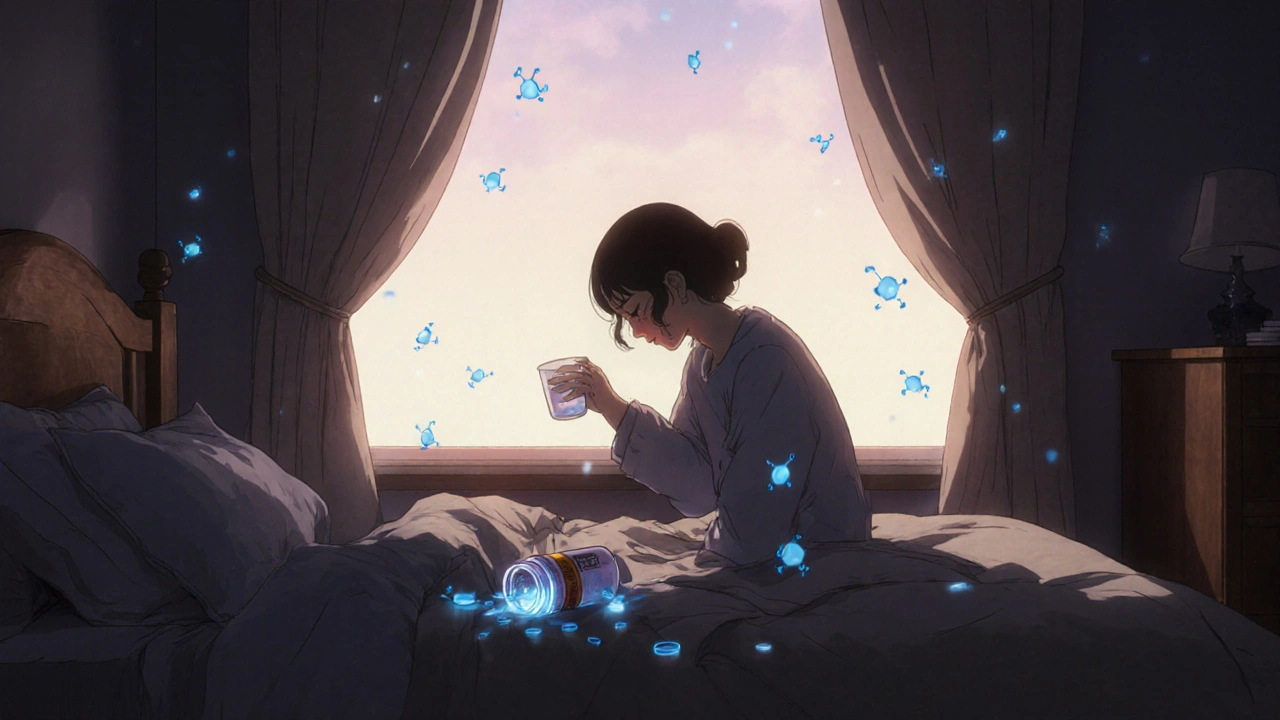
It’s not rare for someone to take an extra pill by accident. Maybe you forgot you already took your morning dose. Or you started a new medication and didn’t realize it could clash with what you’re already on. But when it comes to antidepressants, even a small mistake can trigger something dangerous: serotonin syndrome.
What Exactly Is Serotonin Syndrome?
Serotonin syndrome isn’t just an allergic reaction or a bad side effect. It’s a medical emergency caused by too much serotonin building up in your body. This happens when you take too much of an antidepressant - or mix it with another drug that also boosts serotonin. It’s not about being "overdosed" in the traditional sense. Sometimes, even taking the right dose of two different medications together can push you over the edge.
The first cases were noticed back in the 1960s, right after antidepressants became widely used. Today, it’s becoming more common. In Australia, reports to the Centre for Adverse Reactions Monitoring show a 38% rise in cases between 2015 and 2022. SSRIs like sertraline and escitalopram are involved in over 60% of cases. SNRIs like venlafaxine make up another quarter. Even some painkillers, migraine meds, and cough syrups can be the hidden trigger.
The First Signs: Don’t Ignore the Shaking
Most people think of serotonin syndrome as something that hits hard and fast - and they’re right. Symptoms usually appear within hours, sometimes as quickly as 30 minutes after a new dose or interaction.
The earliest and most common sign? Tremors. Not just a slight shake. Think fingers twitching uncontrollably, your hands trembling when you try to hold a cup, or your leg jumping on its own. It’s not anxiety. It’s physical. And it’s often the first red flag.
Right after tremors come muscle twitching - sudden jerks you can’t control. You might feel restless, wired, like you can’t sit still. Your heart might race. You could break out in sweat even if the room is cool. Your pupils might look wider than usual. Nausea or diarrhea can hit hard, too.
These aren’t just "bad side effects." They’re your body screaming that serotonin levels are out of control. And if you wait, it gets worse.
The Red Flags: When It Turns Life-Threatening
What starts as a tremor can spiral into something deadly within hours. The real danger kicks in when three key systems go haywire: your brain, your nerves, and your body’s temperature control.
Here’s what to watch for next:
- Clonus - this is the most telling sign. Try this: gently press your foot upward. If your toes suddenly jerk or spasm repeatedly, that’s clonus. It’s not normal. It’s a hallmark of serotonin syndrome and shows up in over 90% of confirmed cases.
- Muscle rigidity - your limbs feel stiff, locked, like they’re made of steel. Not just tense. Unmovable.
- High fever - above 38.5°C (101.3°F). If your temperature hits 40°C (104°F) or higher, your muscles start breaking down. That’s rhabdomyolysis. It can fry your kidneys.
- High blood pressure and fast heartbeat - systolic pressure over 160 mmHg, heart rate over 100 bpm. Your body is in survival mode.
- Confusion, agitation, hallucinations - you might feel detached from reality. Some people report seeing things that aren’t there.
- Seizures or loss of consciousness - this is critical. If you or someone else stops responding, calls for emergency help immediately.
These aren’t symptoms you can wait out. They need hospital care - fast. About 30% of people with serotonin syndrome end up in intensive care.
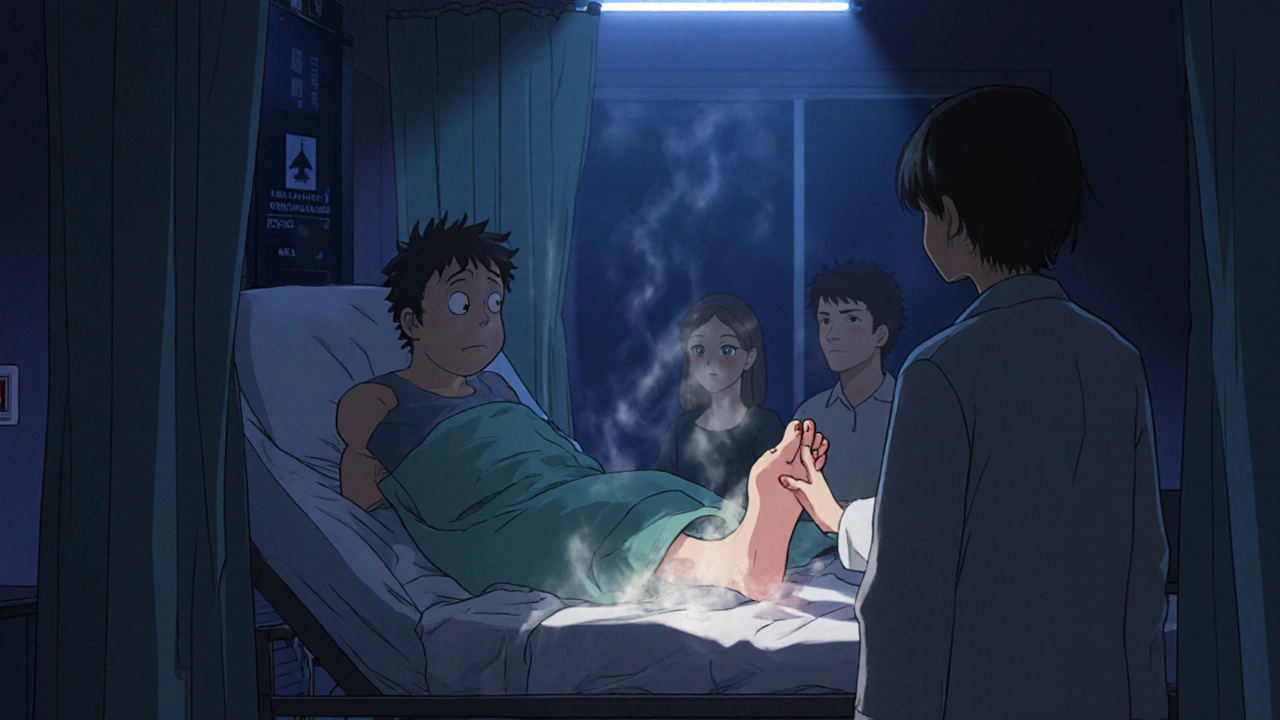
Why It’s Often Missed
Doctors miss serotonin syndrome more often than you’d think. In one study, one in four cases went undiagnosed. Why? Because the symptoms look like other things:
- Flu - fever, chills, nausea, diarrhea.
- Anxiety attack - racing heart, sweating, restlessness.
- Neuroleptic malignant syndrome (NMS) - a similar but rarer condition caused by antipsychotics. The big difference? NMS causes slow, stiff muscles, not twitching or clonus. And it takes days to develop, not hours.
- Anticholinergic toxicity - from drugs like Benadryl or some sleep aids. That one gives you dry mouth, no sweat, and constipation - the opposite of serotonin syndrome.
Doctors rely on the Hunter Serotonin Toxicity Criteria to confirm the diagnosis. It’s simple: if you have clonus plus agitation or sweating, or tremor plus hyperreflexia, or high fever plus clonus - it’s serotonin syndrome. No blood test needed. No fancy scan. Just the right signs in the right combo.
What to Do If You Suspect It
If you or someone you know is showing even two of these symptoms - especially tremors, clonus, or high fever - call emergency services immediately.
Don’t wait. Don’t call your GP. Don’t try to "sleep it off." This is a 911 situation.
While waiting for help:
- Stop taking all antidepressants and other medications - unless told otherwise by a paramedic.
- Remove extra clothing. Cool the person down with wet cloths or a fan. Don’t use ice baths - rapid cooling can shock the system.
- Keep them calm. Talk quietly. Loud noises or bright lights can make agitation worse.
At the hospital, treatment is straightforward but urgent:
- They’ll give you benzodiazepines like lorazepam to calm the nervous system and stop muscle spasms.
- IV fluids to prevent dehydration from sweating and vomiting.
- In severe cases, they’ll give cyproheptadine - a specific antidote that blocks serotonin. It’s not available over the counter, but it works fast if given early.
Most people recover within 24 to 72 hours if treated quickly. But if it’s ignored, death can happen from heart failure, kidney collapse, or uncontrolled fever.
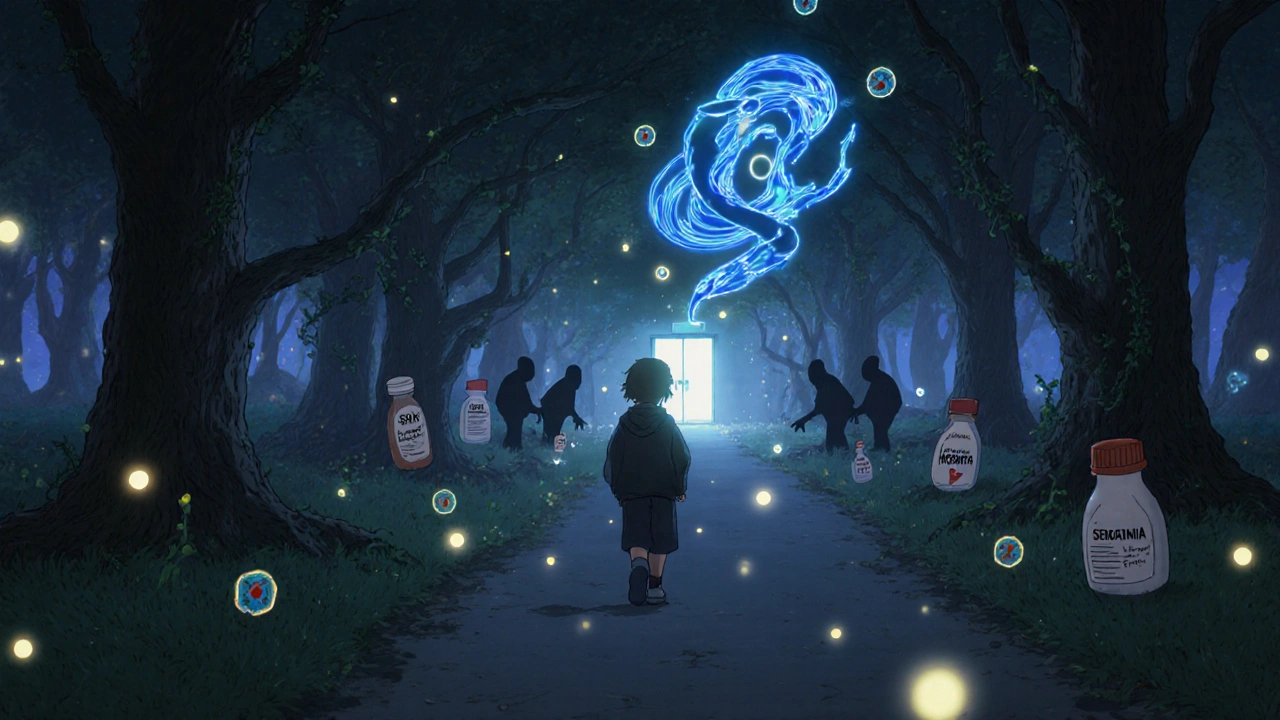
How to Prevent It
The best way to avoid serotonin syndrome? Know what you’re taking - and tell your doctor everything.
Here’s what works:
- Never mix antidepressants without supervision. Combining SSRIs and SNRIs is risky. Mixing them with MAOIs is dangerous. If you switch from an MAOI to an SSRI, you must wait at least 14 days. No exceptions.
- Check every new medication. Tramadol, fentanyl, dextromethorphan (in cough syrup), triptans (for migraines), St. John’s Wort, and even some herbal supplements can trigger this. Ask your pharmacist: "Is this safe with my antidepressant?"
- Keep a medication list. Write down every pill, patch, or supplement you take. Bring it to every appointment. One study found this cuts risk by 62%.
- Know your signs. If you’ve been on antidepressants for a while and suddenly feel shaky, sweaty, or nauseous after a new drug or dose change - don’t brush it off.
- Teach someone close to you. Your partner, parent, or friend should know what to look for. Many people don’t realize they’re in trouble until someone else notices.
And if you’re just starting an antidepressant? Pay attention for the first two weeks. That’s when the risk is highest. If something feels "off," speak up - even if you think it’s "just anxiety."
Final Thought: This Isn’t Rare - But It’s Preventable
More than 78% of serotonin syndrome cases happen because someone was taking two or more serotonergic drugs. That’s not an accident. It’s a gap in communication. Too many people are prescribed antidepressants without being told about these risks. One Reddit thread with over 1,200 comments showed that 68% of people weren’t warned about serotonin syndrome when they started their medication.
You don’t need to be afraid of your antidepressant. But you do need to be informed. These drugs save lives. But they can also turn deadly if you don’t know the warning signs.
Know your body. Know your meds. And if something feels wrong - don’t wait. Act fast.
Can serotonin syndrome happen with just one antidepressant?
Yes, but it’s rare. Most cases happen when two or more serotonergic drugs are combined. However, taking a very high dose of a single SSRI or SNRI - especially in someone with liver problems or who’s elderly - can cause serotonin syndrome on its own. Overdose isn’t always intentional. Sometimes it’s accidental, like taking a double dose because you forgot you already took one.
How long does serotonin syndrome last?
It depends on the drug involved. For short-acting medications like tramadol or dextromethorphan, symptoms usually clear up in 24 hours. For SSRIs and SNRIs, which stay in your system longer, it can take 5 to 7 days. With proper treatment, most people start improving within hours of getting benzodiazepines or cyproheptadine. Full recovery typically happens in 1 to 3 days.
Is serotonin syndrome the same as serotonin withdrawal?
No. They’re completely different. Serotonin syndrome is caused by too much serotonin. Withdrawal (sometimes called antidepressant discontinuation syndrome) happens when you stop or reduce a serotonin-boosting drug too quickly. Symptoms include dizziness, nausea, brain zaps, anxiety, and sleep problems - but no fever, clonus, or muscle rigidity. Withdrawal is uncomfortable but not life-threatening.
Can I take ibuprofen or acetaminophen with antidepressants?
Yes. Regular pain relievers like ibuprofen and acetaminophen don’t increase serotonin levels and are generally safe with antidepressants. But avoid combination cold and flu remedies - many contain dextromethorphan, which can trigger serotonin syndrome. Always check the label or ask your pharmacist.
Do all antidepressants cause serotonin syndrome?
Not all. Tricyclic antidepressants (TCAs) like amitriptyline and older MAOIs carry lower risk. SSRIs and SNRIs are the most common culprits. But the risk increases dramatically when you mix them with other drugs - even ones you think are harmless, like cough syrup or migraine pills. It’s about the combination, not just the medication itself.
What should I do if I think I’m having serotonin syndrome but I’m not near a hospital?
Call emergency services immediately. Do not drive yourself. If you’re alone, call a friend or family member to come over and help you. While waiting, stop all medications, lie down in a cool room, and try to stay calm. Do not try to treat it yourself with home remedies. This is not something you can wait out - every minute counts.
Can serotonin syndrome come back after treatment?
It can, if you restart the same medication or a similar one too soon. After recovery, doctors usually wait at least a week before considering restarting any serotonergic drug - and even then, they’ll start at a very low dose. Never restart on your own. The risk of recurrence is high, and the second episode can be more severe.
Are there any natural remedies or supplements that can help?
No. There are no safe natural remedies for serotonin syndrome. Trying to treat it with herbs, vitamins, or home treatments can delay critical care and make things worse. Cyproheptadine is the only proven antidote, and it requires a prescription. If you suspect serotonin syndrome, get to a hospital - not a wellness center.
10 Comments
Write a comment
More Articles
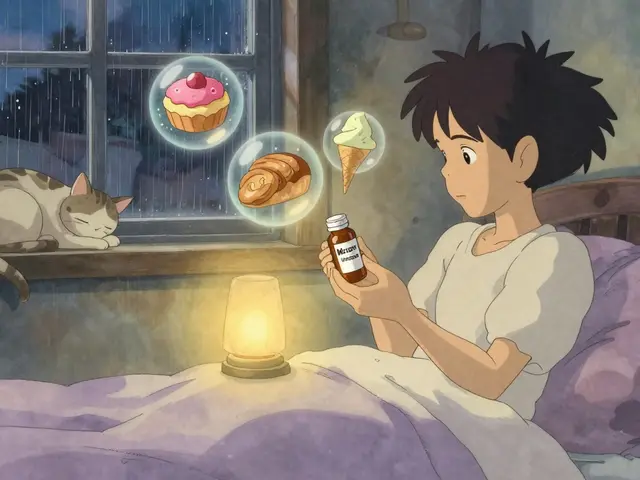
Mirtazapine and Weight Gain: What You Need to Know About This Common Side Effect
Mirtazapine is an effective antidepressant but commonly causes weight gain due to increased appetite and metabolic changes. Learn how much weight people gain, why it happens, and practical ways to manage it without stopping the medication.

Jet Lag and Time-Released Medication Dosing Across Time Zones: What Actually Works
Time-released melatonin doesn't help jet lag-it makes it worse. Learn why immediate-release melatonin, taken at the right time, is the only proven way to reset your body clock after long-haul flights.
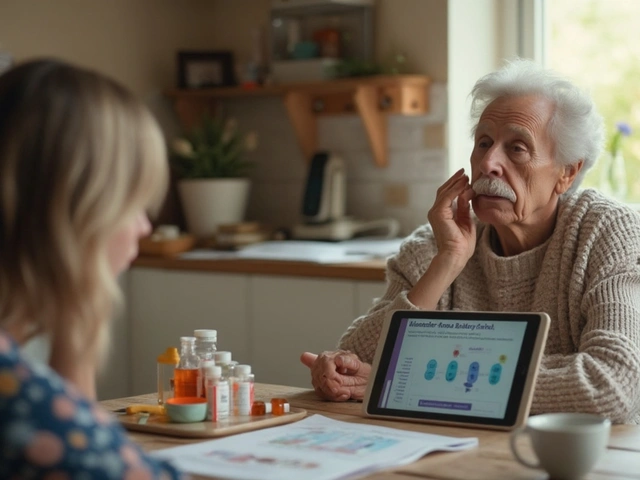
8 Aducanumab Alternatives: What Else is Out There for Alzheimer's?
Confused by the options beyond Aducanumab for Alzheimer's? This article breaks down eight alternatives, from experimental drugs to currently available treatments. Each option gets compared side by side for how well it works, how it's taken, and what people have actually experienced. You'll find helpful details and clear pros and cons for each, including why some promising ideas just didn’t pan out. It's practical, candid, and tailored for anyone wondering what’s really out there besides Aducanumab.

Brandy Walley
November 22, 2025 AT 15:25lol who even cares anymore everyone just pops pills like candy these days i took 3 sertraline once and just laughed my ass off for 3 hours